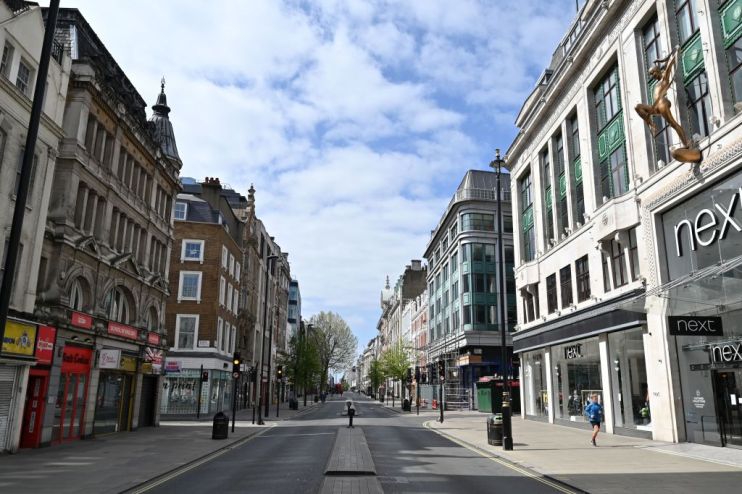UK retail sales suffer worst fall in 25 years due to lockdown

UK retail sales suffered the worst decline on record last month due to the coronavirus lockdown, however food and online sales jumped as Brits stayed at home.
Total UK retail sales decreased 4.3 per cent in March, against a drop of 1.8 per cent in 2019, which is the worst fall in 25 years, following the closure of non-essential stores.
In the first three weeks of the month UK retail sales were up 12 per cent, but declined 27 per cent in the two weeks to 4 April after the government ordered all non-essential retailers to shut.
In the three months to March in-store UK retail sales of non-food items plunged 13 per cent on a total and like-for-like basis due to the lockdown.
However, food sales increased 4.9 per cent on a like-for-like basis, higher than the 12-month average growth of 2.4 per cent, due to a surge in stockpiling.
The British Retail Consortium said food retail sales spiked at the beginning of the month, but dropped following lockdown.
Online non-food sales increased by 18.8 per cent during the month, compared to 2.5 per cent last year, as consumers shopped online to adhere to social distancing rules.
The non-food online penetration rate increased from 29.3 per cent in March last year, to 43.5 per cent last month.
Some retailers, such as Next and Quiz, have resumed online operations after closing their warehouses last month over safety concerns in order to drive revenue despite the closure of physical stores.
“The crisis continues; the retail industry is at the epicentre and the tremors will be felt for a long while yet,” said BRC chief executive Helen Dickinson.
“Many physical non-food retailers have been forced to shut down entirely or to limit themselves to online only to protect customers and staff.
“Consequently, hundreds of thousands of jobs at are risk within these companies and their supply chains.
“At the same time, supermarkets brace themselves for lower sales, while still spending huge sums on protective measures, donating to food banks and hiring tens of thousands of temporary staff.”
Supermarket and subscription sales soar
Spending on essential items rose 11.6 per cent in March, driven by a 21.3 per cent jump in supermarket sales.
Spending at off licences and greengrocers soared 30.5 per cent as more than half of shoppers chose to support local independent businesses.
In the week before the government announced the coronavirus lockdown, spending at specialist stores was up 80 per cent and up 49 per cent at supermarkets, as Brits anticipated the introduction of tougher restrictions.
Discount stores also saw increased demand, rising 25.2 per cent while pharmacy, health & beauty was up 0.5 per cent.
Restaurants and bars and pubs and clubs suffered a drop in spending of 35.5 per cent and 22.2 per cent respectively and non-essential spending dropped 12.9 per cent due to social distancing measures.
But spending on digital content and streaming subscriptions soared 17.4 per cent as consumers stayed home, according to Barclaycard data.
UK retail sales to plunge further in April
Analysts said that UK retail sales data for April is expected to be even worse, as it will represent a full month of lockdown.
Shore Capital Markets said: “Such data can reasonably be expected to follow-through on an even worse basis in April, given a somewhat lost Easter and the probability of a full period of non-essential store closures, data that will also skew the potential updates in 2021 and probably thereafter for a period.
“We await today confirmation as to the extension period of the lockdown in Great Britain, with Northern Ireland announcing a shutdown to the 9th May 2020 yesterday.”
Hope for online retailers?
Retailers with a strong online presence are best positioned to weather the coronavirus storm, analysts said. Some retailers, such as Next, Quiz, and Dunelm, have already reopened their online operations, after closing them in March over safety concerns.
“Behind the headline figures there will be a divergence, with those shops that have a good online presence and also sell some household essentials getting a boost from people being in their homes more and relying on deliveries, while those retailers who haven’t pivoted to online facing a real struggle,” Laura Suter, personal finance analyst at AJ Bell, said.
Kit Juckes, analyst at Societe Generale, said :As we hunker down to eat, stream films, plays and TV shows, while ordering various gadgets we didn’t know we needed, there are winners.”
Shore Capital Markets said a ” step change in online penetration” could be one of the key outcomes of the coronavirus crisis in the UK.